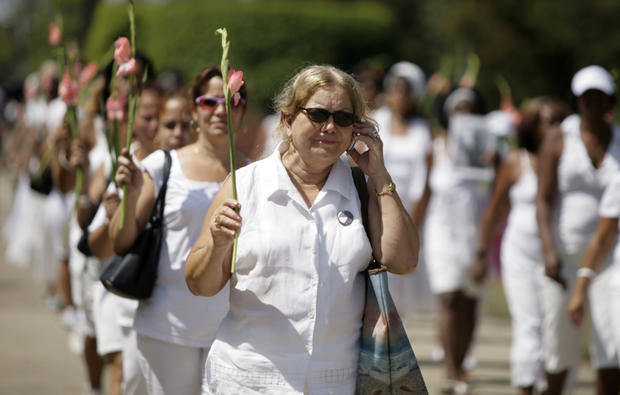Laura Pollan, leading Cuban dissident, dies at 63
HAVANA--Housewife, school teacher and eventually one of Cuba's best known political activists Laura Pollan died Friday evening just a week after being hospitalized with respiratory problems.
Pollan, 63, was the founder of Ladies in White, relatives of political prisoners who broke government controls to stage weekly protest marches in Havana's upscale Miramar neighborhood demanding the release of their loved ones.
Her widower, former political prisoner Hector Maseda told the press his wife died of a "cardiorespiratory attack". Doctors, he said, had worked unsuccessfully for nearly an hour to revive her.
Pollan was taken to Havana's Calixto Garcia hospital Friday a week ago with acute respiratory problems and moved into ICU on Saturday October 8.
Her daughter from a previous marriage, Laura Labrada, said doctors had performed a tracheotomy earlier in the day. They'd also found Pollan to have a strain of dengue fever but an aggressive respiratory virus was the chief cause of her suffering, according to Labrada.
At the hospital the family discouraged media coverage and Pollan's second in command of the Ladies in White, Berta Soler, refused to say anything to the press.
Reuter's reports that Maseda said a wake would be held in the small Centro Habana home he shared with Pollan. Her body, he told them, would be cremated according to her "last" wish and eventually her ashes would be scattered in a field with flowers. Reuters quotes Maseda saying: "Whatever we do is a family matter; it has no other nature. Of course, we wish that the wake doesn't turn into propaganda because it's a family matter. We insist that it's a family matter."
As cameras rolled, Pollan's body was loaded into an ambulance to be taken to the medical examiner for an autopsy.
Speaking to journalists outside the hospital, dissident Manuel Cuesta Morua said Pollan's death was a "hard blow for human rights and the pro-democracy community". Cuesta said the first thing was to offer support to her family and only later would they consider what to do about keeping up the opposition movement. He said that the loss of Pollan was "a blow that I don't know if it's repairable."
Pollen, short and stocky, with long dyed blond hair and bright green eyes, became a vocal government opponent after her husband and 74 other dissidents were rounded up and jailed in March 2003 in what came to be called the Black Spring. The 75 received sentences ranging from six to 28 years. Her husband was given a 20-year sentence. All of the 75 have since been released, most last year following a deal brokered by the Cuban Catholic Church and the Cuban Government. Many observers feel it was the tenacity of the Ladies in White and Pollan, in particular, that won the prisoners' freedom.
The Ladies in White got their name because dressed totally in white and carrying gladiolas they attended Sunday mass and then paraded silently down Havana's posh Fifth Avenue to demand the release of their relatives. The group grew from about a dozen women to some thirty in the decade since they came together. The Government tried to stop their demonstrations but after their efforts generated adverse international reactions they allowed the women to continue their protests. Periodically, however, the Ladies in White would be accosted by pro-government counter demonstrators. The Government claimed these incidents were spontaneous responses from the Cuban people but there was always a heavy presence of plain clothes State Security agents in the crowds.
Cuba describes the dissidents, including the Ladies in White, as mercenaries of the United States. Officials denounced the women for taking money from anti-Castro groups including pro-violence ones based in Miami. Pollan admitted to get funding from such groups but said the Ladies were left with no alternative by which to support themselves.
The European Union awarded the group with its highest human rights distinction, the Sakharov Prize for Freedom of Thought but an enraged Cuban Government did not permit Pollan to travel to Europe to accept the award.
Dissident blogger Yoani Sanchez told the press gathered outside the hospital that the impact of Pollan's death on the Ladies in White and on the civic movements would have to be seen but she believes the pain could be a unifying factor and bring opposition forces together.
Sanchez criticized doctors for being slow to diagnose the problem but noted they worked to the end trying to save her. Pollan, she noted, suffered from several chronic illnesses but insisted that a determining factor in her decline was "the heavy psychological and physical tension to which she was subjected in these last months". Events in recent weeks, claims Sanchez, impacted negatively on Pollan's health, greatly weakening her immune system.
Although the Ladies in White had formed to fight for the release of their relatives from prison once that had been won, Pollan declared they would continue to demonstrate for the release of all political prisoners, including those incarcerated for sabotage and highjackings--crimes that kept these prisoners off of Amnesty International's list. In response the Cuban Government upped its efforts to silence the organization.
